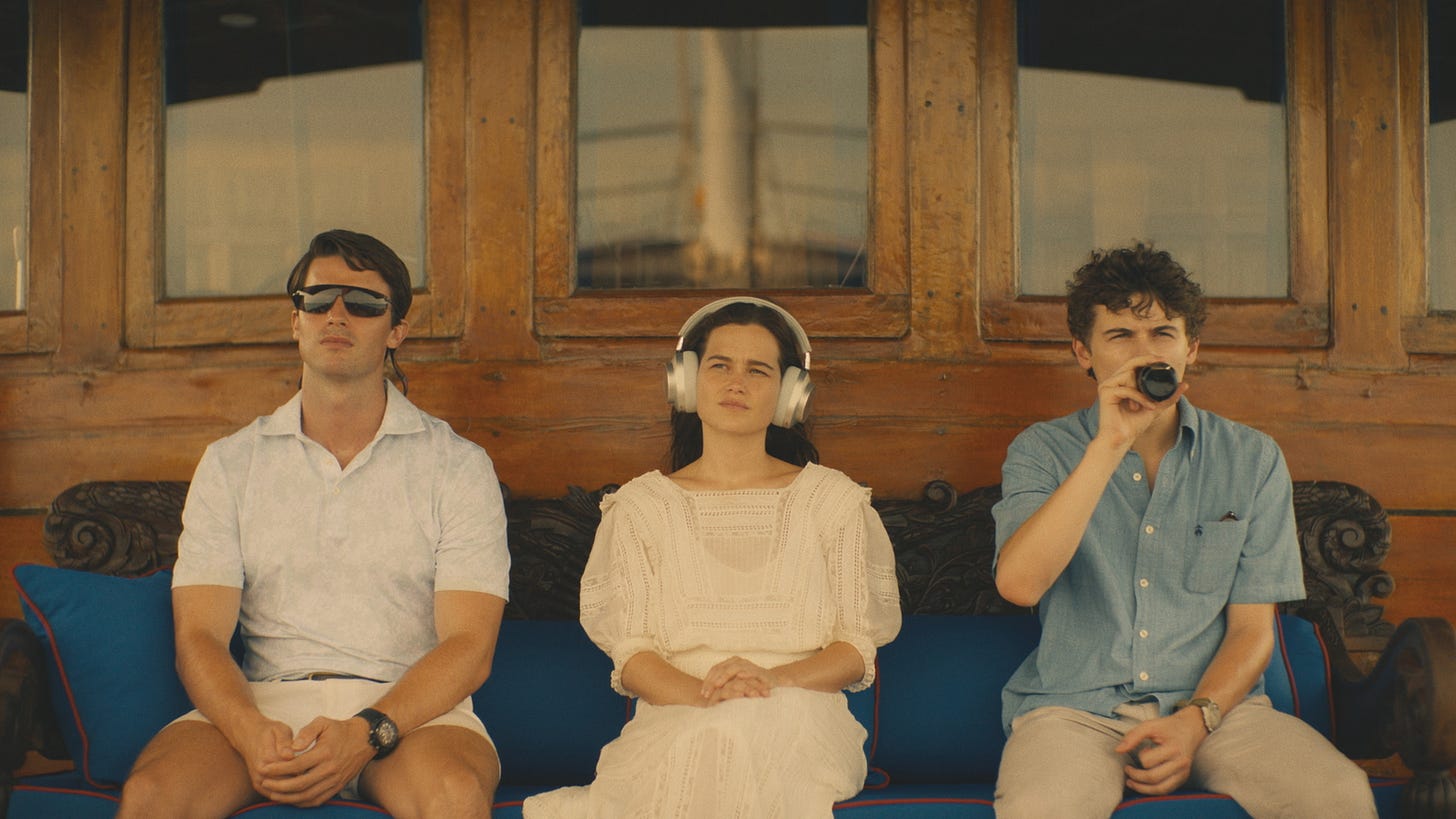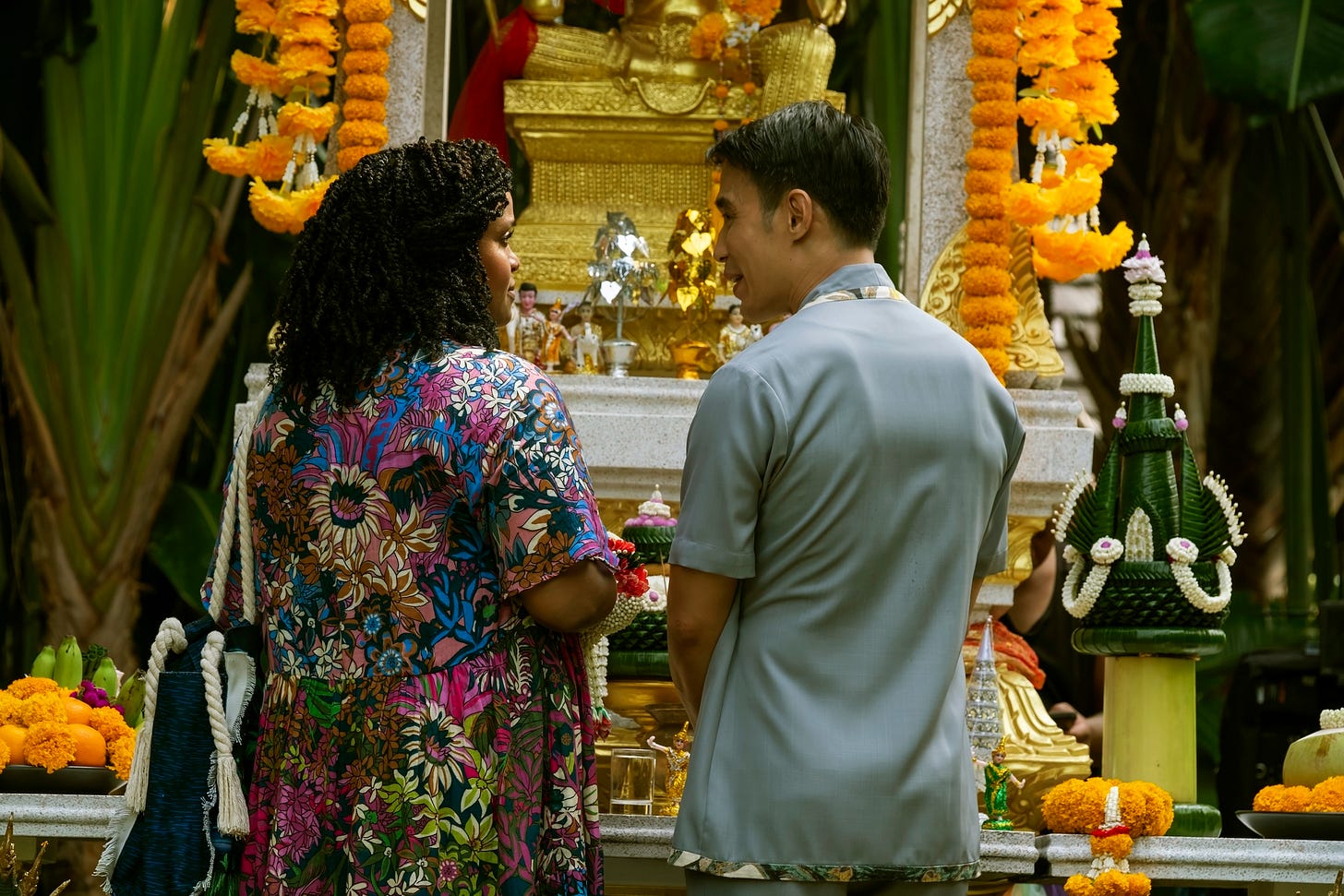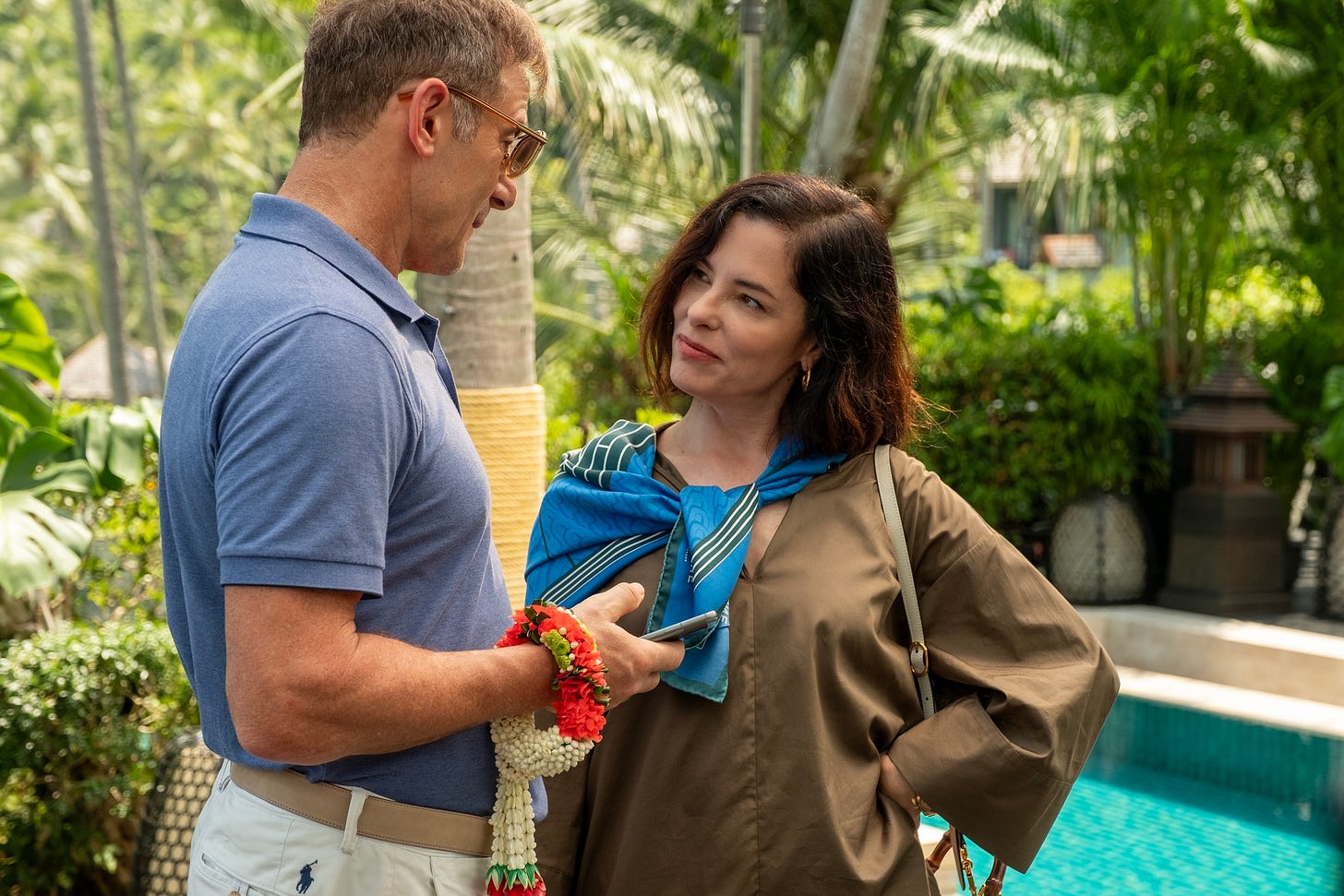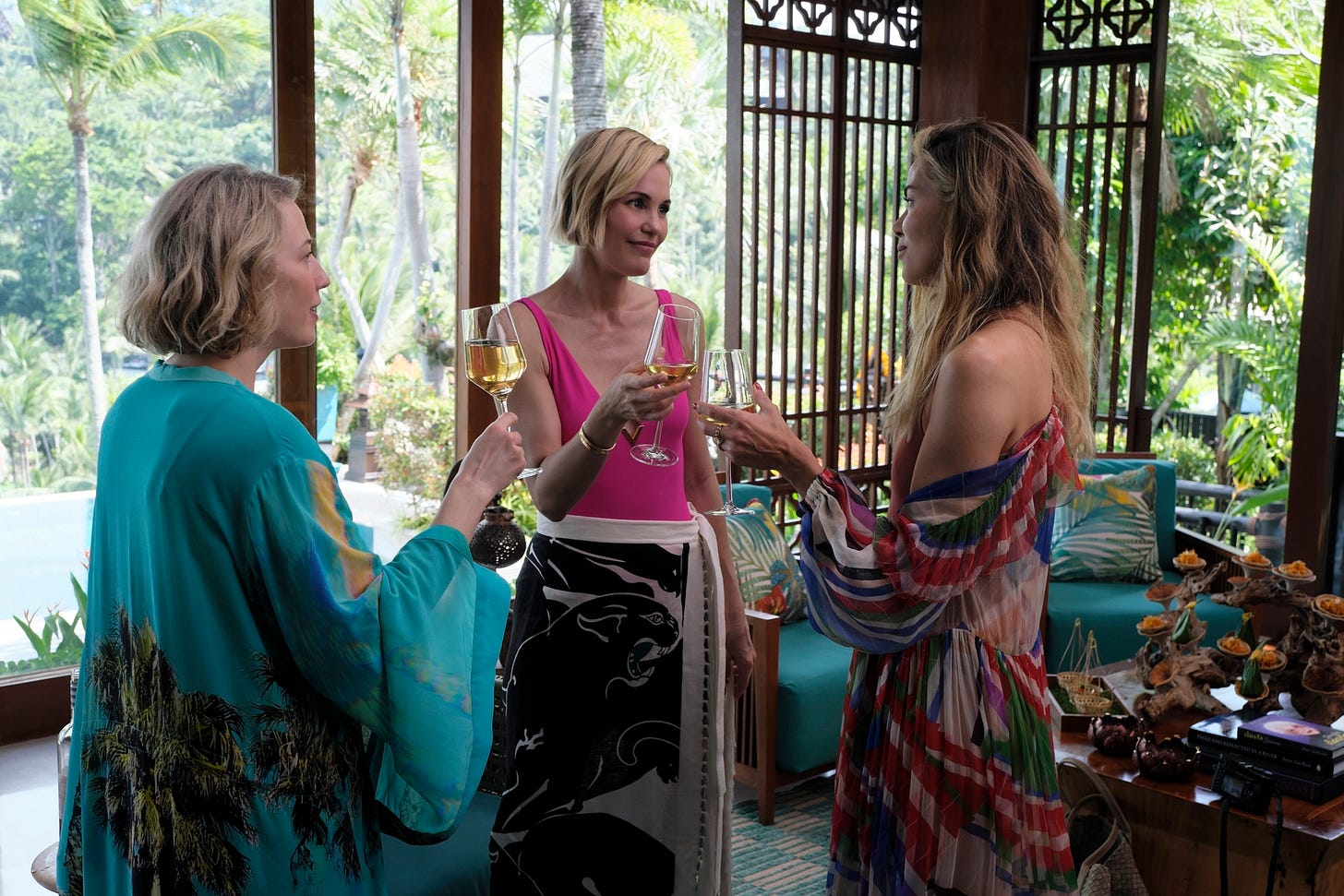Review: The White Lotus, “Same Spirits, New Forms” | Season 3, Episode 1
A promising premiere feels familiar but teases a season of introspection
Welcome back to Episodic Medium’s coverage of The White Lotus after another 2+ year hiatus in a TV season full of them. As always, this first review is free, but subsequent reviews will be exclusive to paid subscribers. To join the conversation and follow along with Ben’s reviews, click below.
The day The White Lotus scored a second season, it transformed from miniseries to ongoing TV show—an anthology show, most accurately, though each subsequent season has featured the return of a couple characters to maintain a common thread of serialized plot. Beyond those shared story elements, though, and the consistent setting of a luxury resort chain, what really is this series about? Creator/writer/director Mike White has suggested that while season one focused on money and season two focused on sex, season three would be a “satirical and funny look at death and Eastern religion and spirituality.” That sentence suggests that each installment of this show varies greatly from the others in theme, even if the tone and satirical framework remain the same.
But the comparison is also relative. Yes, season one focused more on class than season two, but class issues are an important piece of practically every story on the show. Sex may have been the main focus of season two, but it comes into play in every season, always illustrating who these characters are to each other and to themselves. And while the setting of Thailand allows for an exploration of Eastern religion unique to this season, the theme of death has been core to the show since the beginning. This is a sort of murder mystery, after all.
So The White Lotus is a show about money and sex and death, and I’m sure some other themes that White will explore in future seasons (there’s already a fourth guaranteed). And for me, those ingredients still make for a pretty great cocktail, even when it tastes a little familiar.
In terms of the death and spirituality of it all, those themes aren’t quite front and center yet, but the resort’s proximity to a monastery should provide an easy in, along with its wellness program—started by one of the owners, a woman named Sritala Hollinger (Lek Patravadi) who studied health after contracting an autoimmune disease, and staffed by “health mentors” like Mook (Blackpink’s Lalisa Manobal) and Valentin (Arnas Fedaravičius) who encourage a “digital detox.” The opening flashforward is also a more visceral example of off-screen violence than usual for this show: the death isn’t past but present, with Zion (Nicholas Duvernay) less a neutral observer who discovered a corpse than a terrified bystander actively worried for his mother’s life during an ongoing crisis. The stakes feel higher than ever, even though I’m pretty certain White wouldn’t kill off Belinda (a returning Natasha Rothwell)—and Zion’s desperate prayers at the foot of a Buddha statue bring the religious theme home.
Once the narrative jumps back, though, it feels like business as usual, introducing the three main groupings of guest characters as they meet the staff and settle into their villas. Of the major characters, Rick Hatchett (Walton Goggins) is easily the most mysterious: Goggins is more depressive and irritable than I’ve ever seen him, toning down his natural sly charm in favor of an oppressive grouchiness. He’s the hardest to engage with emotionally at this point, just because of the elliptical nature of his motivations and his profession, and we don’t get any real insight into why he’s in Thailand besides his apparent interest in Sritala’s husband Jim.
Thank god for Aimee Lou Wood’s Chelsea, a shining ray of light who adds a much-needed dose of charm and fun to his scenes. On its face, this relationship might look like so many of the other May-December couples out here—Chelsea’s new friend Chloe (Charlotte Le Bon) calls the numerous wealthy bald boyfriends “LBHs,” meaning “losers back home”—but Chelsea really does seem to care about Rick, separate from whatever lavish lifestyle he provides her. My bigger question is what he gets out of the relationship. Sex and love, presumably, but he’s so cold to her whenever we see him.
Then there are the Ratliffs, the wacky family who take up the biggest real estate in the story so far. Here’s where the déjà vu kicks in: they’re reminiscent of the Mossbachers from the first season in many ways, down to how much of the show’s comedy comes from watching them all sit in a room and bounce off each other. Financier Tim (Jason Isaacs) is an alpha male with some of Steve Zahn’s dorky dad energy. Parker Posey’s Victoria fills the Jennifer Coolidge void as the biggest performance of the season, which for the time being makes her an amusing caricature. Older brother Saxon (Patrick Schwarzenegger) has much of Shane’s frat-bro-graduated-to-finance essence. Piper (Sarah Catherine Hook) is the new Quinn, here with a genuine interest in learning and growing as a person despite her shallow parents. And little bro Lochlan (Sam Nivola) is the new Albie from season two, a nice boy going through the same crisis of masculinity that many do at his age.
But I think there’s real potential to some of the characters here. For one, there’s a dark, delicious thrill to the potential of watching Tim’s life slowly crumble while he’s supposed to be enjoying a tropical paradise with his family. (It seems certain he’s implicated in whatever those Wall Street Journal writers are looking into.) This is a man who believes himself to be the perfect dad, living the perfect life—everyone tells him so, including Victoria at the end of the premiere. That’s a lot to live up to. Watching your family’s unblemished perception of you slowly die—in a way, that’s even scarier than the idea of losing the comfortable life you’ve built for yourself. Isaacs conveys those fears with every anxious expression.
The three siblings might all be types at this point, but the war for a younger sibling’s soul (and for control of his college plans) is a fun conflict to build a story around, with parents and siblings alike putting pressure on a kid who’s just trying to be a kid and enjoy his life. And there’s something intriguingly off in general about the siblings, something that evokes incest even if the show doesn’t end up going there (though they sort of did already in season two). There’s Saxon referring to his sister as “pretty hot” and speculating about her sexuality, but the real weird moment comes when Loch watches him step naked into the bathroom to masturbate. It seems like Loch looks up to and covets his brother’s confidence and unabashed sexuality, to a borderline-erotic degree.
Of course, one corner of the story is predictably shortchanged: the staff itself, here even less present than usual. Sritala seems intriguing, but the general manager Fabian (The Zone of Interest’s Christian Friedel, whom I did not recognize) is a more marginal presence than either Armond or Valentina. And while Gaitok (Tayme Thapthimthong) and Mook have a sweet flirtation going, there’s not much to unpack there yet. He’s second-guessing his modest life after seeing Mook’s attraction to people who can travel and really live life, which pales in complexity compared to the other character dilemmas already established.
But what I’m really looking forward to is the story of Jaclyn (Michelle Monaghan), Kate (Leslie Bibb), and Laurie (Carrie Coon), three old friends here on a “victory tour” (not a “midlife crisis trip”) at the expense of rich TV star Jaclyn. It’s the most original grouping this season, which makes it the standout of “Same Spirits, New Forms,” a sharp and relatable depiction of three friends whose lives have gone in different directions and who may not completely relate on everything anymore.
It’s easy to point out the big moments of friendship imbalance here: Jaclyn and Kate keep complimenting each other and chatting about their success, but Laurie seemingly went through a divorce and still isn’t in a great place. For them this might be a victory tour, but for her it very much is a midlife crisis trip. Coon immediately justifies her casting here, especially in that last scene when she watches her friends talk without her and lets out a contained sob. But I’m even more interested in the ways that the women are cut from the same cloth. There’s a doubling, or more accurately a tripling effect going on here, with lots of dialogue about how looking at one another is “like looking in a mirror.” It feels like a point that season two might have made: people become reflections of one another after spending so much time together at such key points in their lives. An old friend can amplify the parts of ourselves we love and hate the most.
“Identity is a prison,” says the monk on the recording that Piper listens to. “No one is spared this prison. Rich man, poor man, success or failure. We build the prison, lock ourselves inside, then throw away the key.” This premiere may not fully live up to the profundity of that quote, but it feels like an accurate descriptor of the people who come to this resort year after year, looking for a vacation and instead being confronted with themselves. With that idea at the forefront, maybe this could end up the most introspective season yet.
Stray observations
The other big surprise is that Jon Gries’s Greg is here! He and Chloe live together in a house near the resort. I can’t say I’m that pumped to see his story play out—he hasn’t shown much charm or personality since his first season—but it’s probably good that the show is closing the loop on his story. I don’t like the idea of him basically getting away with the Tanya plot without any consequences.
It should go without saying that the visuals of Thailand are jaw-droppingly beautiful in this premiere, possibly even more so than the other two seasons. And White’s eye as a director is better than ever.1
New theme, also by Cristobal Tapia de Veer. It’s not immediately grabbing me in the same way as the previous two seasons’, but still a banger. And I’m already loving the actual score used throughout the episode.
In terms of early intersections between the different groups, so far it’s mainly just Tim and Saxon snapping at Rick about smoking on the boat—and Saxon unsuccessfully flirting with some of the other women, most notably Chelsea.
Continuing White’s tradition of casting contestants from his Survivor season for cameos, Natalie Cole and Carl Boudreaux play two Black guests whom Belinda sees from afar. Their appearance is brief (compared to Kara Kay and Angelina Keeley’s memorable roles in season two’s flashforward), so I’m hopeful they could show up again in another episode. Either way, they look great.
Michelle Monaghan does look like she “just got pushed out of a birth canal,” and I’m super excited to see what she brings to this role. It’s already one of my favorite performances of hers.
Chelsea says she’ll help Rick get his joy back “even if it kills her.” Oh boy!
Also in foreshadowing: The fruit of a pong-pong tree has toxic seeds.
I wonder what to make of Piper’s inability to enter the monastery quite yet.
“I love your teeth.”
“Get laid. Get everything.”
Myles here—I want to know if he went back to watch the Thailand season of Survivor as reference for the nature shots.








Sad they changed the theme song. Singing it during the opening had been one of my favorite ways to annoy my wife.
Has the Wall Street Journal discovered that Tim’s alleged Southern accent sounds about as consistent as Kevin Costner’s Robin Hood accent and that he’s clearly an undercover Brit?